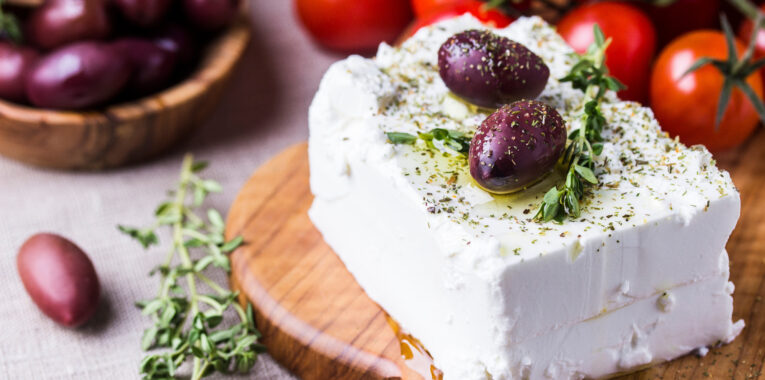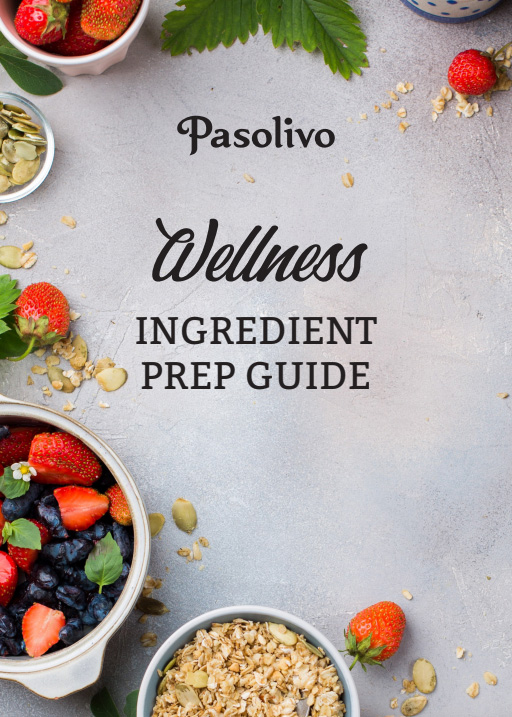The Mediterranean Diet has been highly regarded and recommended by physicians for decades. This culturally focused healthy-eating pattern is known for its miraculous effect on cardiovascular health. There are many other benefits of the Mediterranean Diet, which includes foods like fish, veggies, and, of course, extra virgin olive oil.
Why does the Mediterranean Diet come so highly recommended? Read on to learn more about its origins, what it includes, and how it can help you feel your healthiest. Plus, get your Mediterranean Diet meal plan with healthy recipes.
Origins of the Mediterranean Diet

The term “Mediterranean Diet” originates from a medical study conducted by Ancel Keys in the 1950s called The Seven Countries Study. This research compared the diet and cardiovascular health of cohorts from the USA, Finland, former Yugoslavia, Netherlands, Greece, Italy, and Japan over the course of 50 years. Keys and his team found that populations in Greece and Italy had 39% lower risk for coronary mortality, and 29% lower risk for cardiovascular mortality compared to the U.S.
This phenomenon was attributed to the dietary habits of the selected populations. The Mediterranean Diet originates from ancient societies native to the Mediterranean Basin, otherwise known as “the cradle of civilization.”
Although there are 18 countries that border the Mediterranean, with distinct traditions and varied gastronomy, there are some culinary trends that occur across the entire region. The Mediterranean Diet is centered around whole grains, fruits, vegetables, and lots of olive oil. This diet limits the consumption of red meat and red wine and includes little to no processed carbs or sweets.
Many Mediterranean cultures also emphasize the importance of community. Eating is a celebratory social experience! A Mediterranean local rarely dines alone.
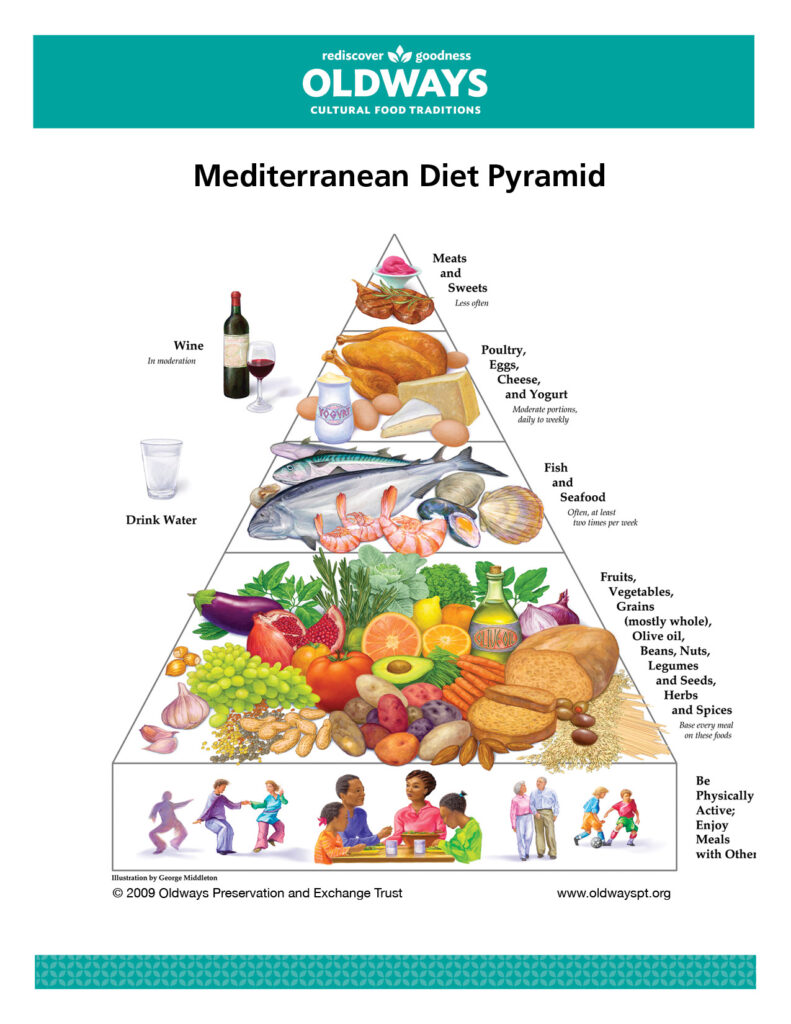
Since The Seven Countries Study, The Mediterranean Diet has been extensively examined for other health benefits in addition to cardiovascular health and heart disease prevention. Further research shows that this healthy lifestyle also improves cognitive function, mental health, longevity, weight loss, lowers cancer risk, and helps prevent type two diabetes. It’s a cure-all lifestyle for a plethora of chronic illnesses.
Why Is the Mediterranean Diet So Healthy?
Olive Oil’s Role in the Mediterranean Diet

Lavish consumption of olive oil is what sets the Mediterranean Diet apart from other fad diets. Extra virgin olive oil makes up 30-40% of daily net calories in the Mediterranean Diet, which is almost double the amount of daily fat intake recommended by the Institute of Medicine.
High quality, cold pressed olive oil is a seriously powerful superfood. It’s made up of monounsaturated fatty acids, which help lower LDL cholesterol. It also contains oleic acid which reduces inflammation and helps lower blood pressure. Extra virgin olive oil is the key to healthy aging in a Mediterranean lifestyle.
Limited Meat and Dairy Consumption
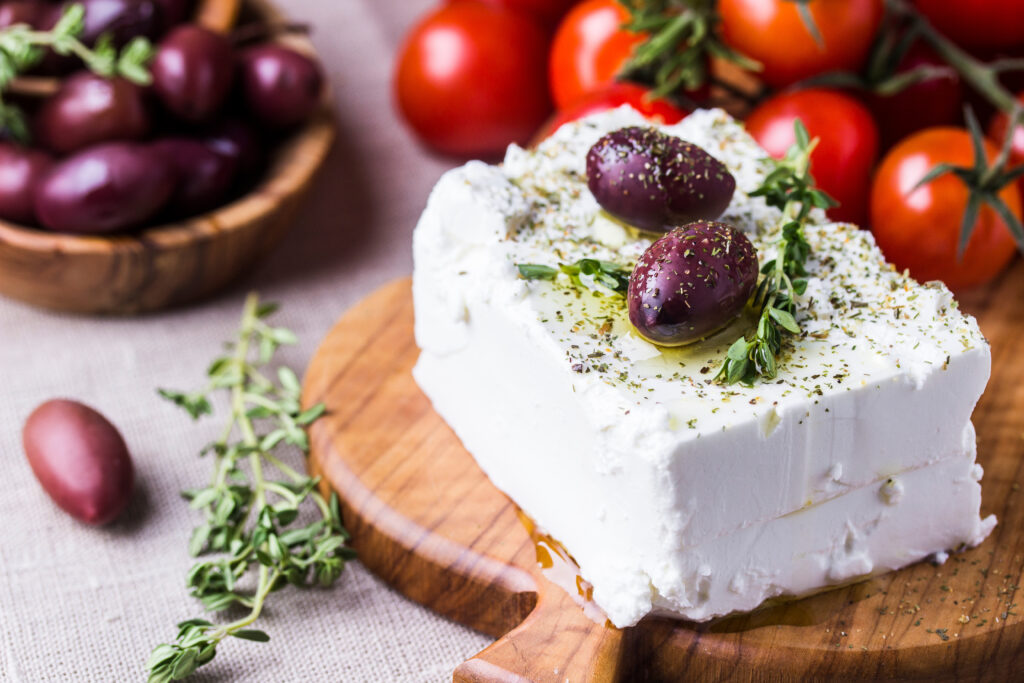
Most Mediterranean populations of the 20th century consumed primarily plant-based meals. Meat products were considered a luxury and eaten a few times monthly or on special occasions. Cheese and yogurt are the primary dairy products in a traditional Mediterranean Diet, used sparingly. Lowering one’s red meat and dairy consumption keeps LDL cholesterol low and reduces inflammation.
Whole Grains
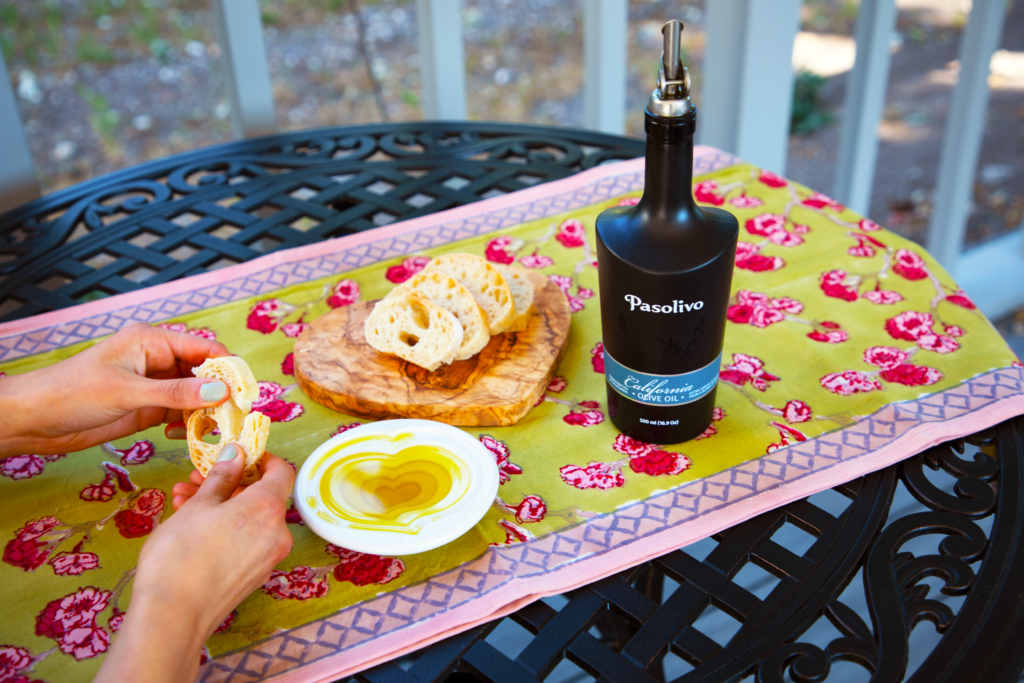
Mediterranean cultures traditionally consume a lot of whole wheat bread and fibrous grains like farro– three to six servings a day. These complex carbohydrates are digested slower than processed grains, making one feel fuller longer than white flour would.
Most whole grain loaves found in the Mediterranean region are sourdough, which has a naturally low glycemic index, meaning it won’t spike your blood sugar like other processed carbs. It’s also probiotic—promoting gastrointestinal health.
Lean Protein
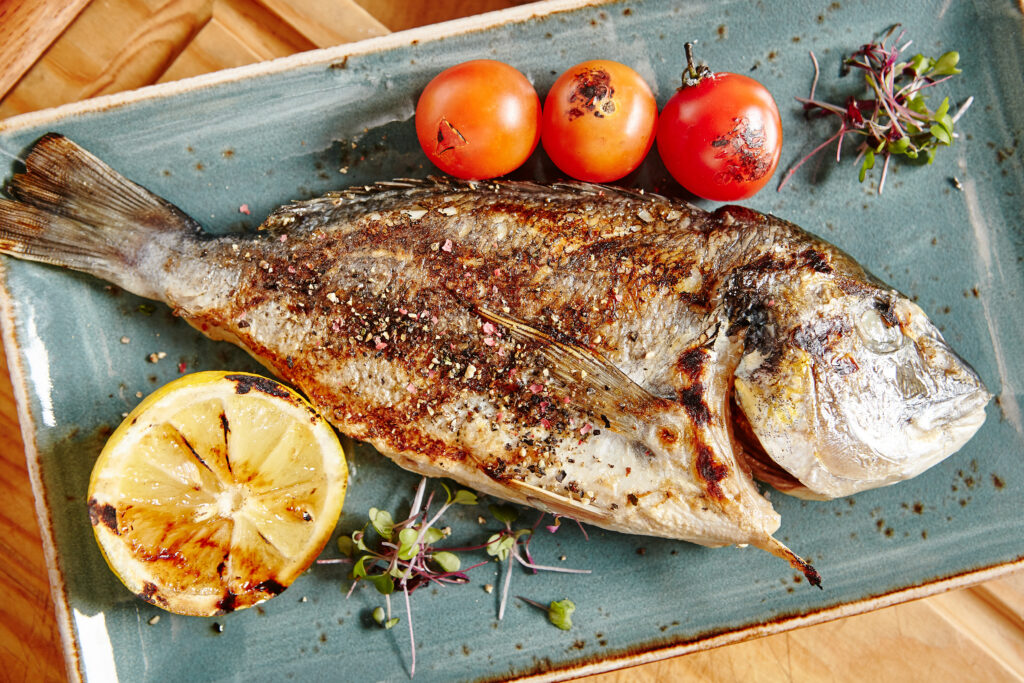
The primary protein consumed in the Mediterranean Diet is seafood. Obviously, due to the geographical location, seafood was abundant in the 20th century and therefore more affordable to the average citizen. The Mediterranean diet recommends two to three 4 oz. servings of seafood a week. Fish is an excellent low-fat source of protein, high in omega-3 fatty acids, and other vitamins and minerals depending on the species of fish.
Plentiful Fruits and Veggies

The Mediterranean Basin is an agriculturally rich area with fertile soil and lush crops. Across the region, on average, Mediterranean populations in the 20th century ate between 3 to 9 servings of vegetables daily, while the average American consumes less than 2.
Vegetables provide the body with essential vitamins and minerals that boost energy and promote overall health. Eating dark, leafy greens rich in B vitamins has also proven to be a natural mood booster! B vitamins play a key role in serotonin production, the “happy hormone.”
Your Mediterranean Diet Meal Plan
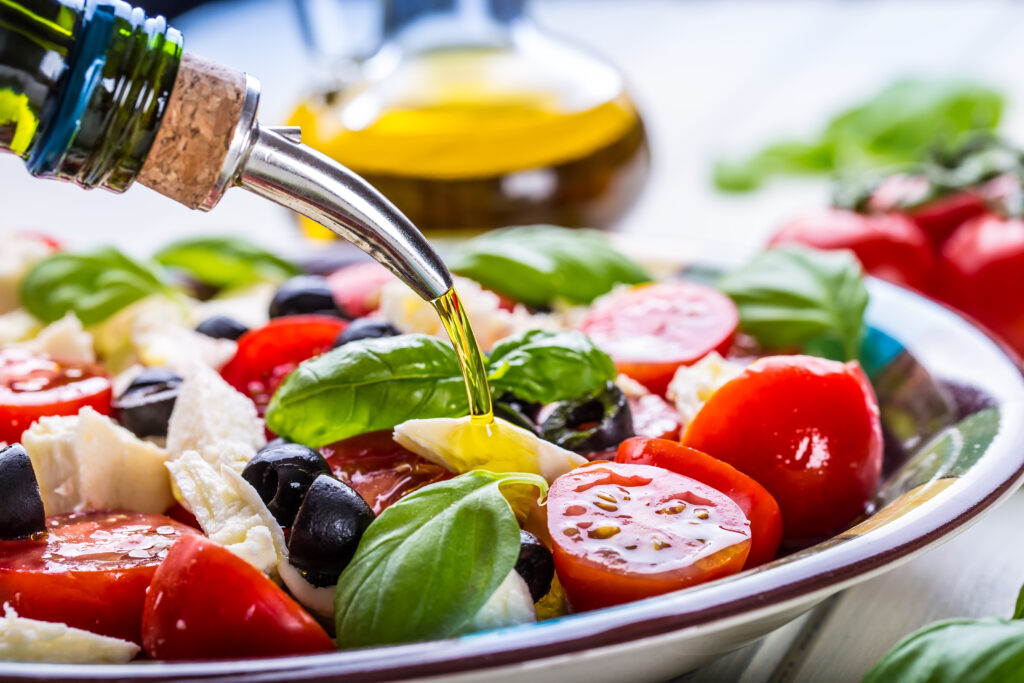
Taking all this information, we’ve created a meal plan that reflects the same healthy patterns of the antiquated Mediterranean Diet. One must also consider the importance of other healthy habits essential to the lifestyle, such as eating with companions whenever possible, and light, daily exercise, like a 30 minute to hour-long walk.
Monday
- Breakfast: Oatmeal with fresh berries, nuts, a drizzle of honey and Tangerine Olive Oil
- Lunch: Greek salad with an olive oil vinaigrette
- Snack: assortment of raw veggies with hummus
- Dinner: Grilled cod or halibut with Quinoa Pilaf and roasted Brussel sprouts
Tuesday
- Breakfast: avocado toast with tomatoes and an olive oil fried egg
- Lunch: Gazpacho with whole-grain garlic bread
- Snack: apple slices sprinkled with Sugar and Spice and a side of almond butter
- Dinner: Nut Breaded Chicken Salad
Wednesday
- Breakfast: goat cheese and spinach frittata
- Lunch: Buddah bowl with brown rice, balsamic roasted mushrooms, arugula, Spicy Italian marinated White Beans and an olive oil vinaigrette
- Snack: whole grain toast with skim milk ricotta, pear, walnuts, basil, a drizzle of honey and Basil Olive Oil
- Dinner: Sheet Pan Maple Garlic Salmon and Asparagus
Thursday
- Breakfast: smoothie bowl with granola and fresh fruit
- Lunch: Lentil Soup
- Snack: Greek yogurt with berries, nuts, and blackberry balsamic reduction
- Dinner: Shakshuka with toasted sourdough
Friday
- Breakfast: zucchini spinach omelet
- Lunch: Beet and Tangerine Salad
- Snack: Chimichurri Spiced Kale Chips
- Dinner: Grilled Chicken Skewers with Mushrooms and Green Onions, with a side of brown rice and roasted veggies
Saturday
- Breakfast: Pistachio Malt Super Green Smoothie
- Lunch: veggie wrap with whole grain tortillas, Spicy Roasted Chickpeas, and an olive oil vinaigrette
- Dinner: Zucchini Fritters with tzatziki and a side salad
Sunday
- Breakfast: buckwheat pancakes with nonfat Greek yogurt and berries
- Lunch: Pickled Blackberry, Fig, & Blue Cheese Salad
- Snack: low-fat cottage cheese and fresh fruit
- Dinner: Eggplant Parmesan Casserole

